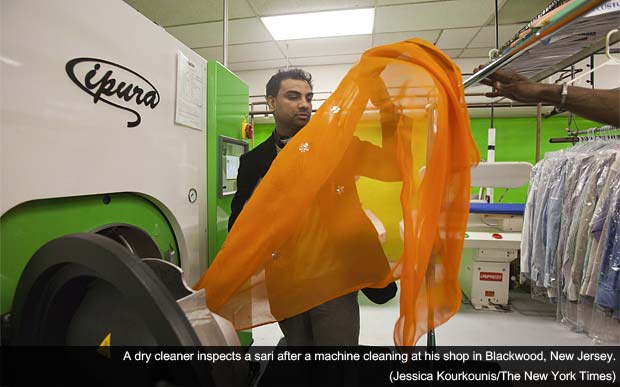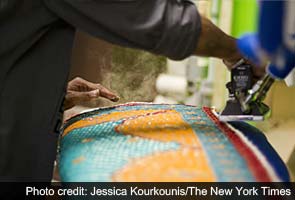A strip of cloth that makes dry cleaners shudder
Vijai Singh, The New York Times | Updated: May 17, 2013 12:45 IST

After Hurricane Sandy made Tanya Aeya evacuate her apartment in Manhattan, she returned to discover that her clothes had been sitting in water for three weeks.
"The embroidery and all the metallic work on it, everything faded and had water marks and water damage," said Aeya, 33, a speech pathologist. She frantically searched for a dry cleaner who would try to salvage her garments.
But almost no one would touch them because they included saris.
With temperatures rising and weddings looming, many women will be slipping on ornate saris, putting the delicate garments in the cross hairs of wayward pieces of food. That possibility makes many a dry cleaner shudder. Forget trying to make red wine stains disappear. Perhaps nothing is more challenging than removing, say, a curry stain from a sari.
"I don't enjoy doing it," said Anil Dua, 55, owner of Edison Organic Cleaners in Edison, N.J.
"The color comes out," he said. "Thread comes out. Beads melt. They are not meant to be dry cleaned even though they have the label 'dry clean only."'
Still, not all dry cleaners are as leery. Samir Patel came up with his own method after buying an IPURA, a $45,000 Italian dry cleaning machine he discovered at a dry cleaning expo.
"They said," recalled Patel, the owner of Dry Clean World in Blackwood, N.J., "as long as you pretreat it right and know what cycle to put it in, you would be able to do anything you want."
After trimming loose threads, treating stains and removing loose dirt, he sprays the fabric with a hydrocarbon solution to see if the colors run. Then, he puts the sari on the IPURA's delicate cycle. After the machine finishes, he steams the sari and presses it. The process takes about an hour and he charges $10 to $50 per piece.
Joon Kyu Park, who owns a dry cleaning store in Queens, has mostly Indian customers. He decided to invest in a top-of-the-line machine after too many complaints about damaged saris.
Leafing through a dry cleaning magazine, Park came across the Satec B-300, a German machine that cost $65,000. Now, he said, "the customers are happy."
Not every piece can be saved.
"One woman brought a garment that had an Indian pickle smell," Dua recalled. "She brought it from India. The pickle container opened up in the suitcase. I cleaned it so many times and it still smelled."
He put it outside to try to air it out. It was stolen.
A sari, which means "strip of cloth" in Sanskrit, is a traditional Indian garment, about 6 yards long, that has been worn in a variety of ways for centuries. The various colors and patterns often have different meanings - Hindu brides, for example, often wear red.
Some women distrust dry cleaners and prefer to clean their own saris, which can cost $300 or more, washing them in a bucket or bathtub, or gently spot-cleaning them.
"Sometimes what I do, I spread it nicely on the dining table or in a big space and then carefully look at where the spot is," said Srimathi Bhatt, 51, a confidential assistant who lives in Queens and owns several dozen saris. "I use delicate soap, such as Ivory soap, to carefully brush these spots," she said.
 Nan Phrsai, 53, who works for the AMC networks and lives in Levittown, N.Y., has a closet filled with about 50 Indian outfits. She says she washes her saris one at a time in her washing machine, sticking them in a pillowcase that she folds and pins shut.
Nan Phrsai, 53, who works for the AMC networks and lives in Levittown, N.Y., has a closet filled with about 50 Indian outfits. She says she washes her saris one at a time in her washing machine, sticking them in a pillowcase that she folds and pins shut.
"If it's going to be ruined, at least I did it," Phrsai said.
Some women go further - waiting until they travel to India to take care of their soiled saris. Assuming that saris are made there, they reason, Indian dry cleaners should know what they are doing.
"I don't trust anyone here," Aeya said.
But Aeya did not want to carry the 30 or so outfits drenched by Hurricane Sandy all the way to India. She called numerous dry cleaners until she reached Patel, the owner of Dry Clean World, who said he would try.
"If there was even a 1 percent chance to save some of my clothes," she said, "I would've spent anything." But despite Patel's efforts, she wound up throwing everything out.
Patel says he embraces the challenge. "My goal is to have an Indian-dry-cleaning-only store by next year," he said. He recently started advertising his business in the sari shops in Iselin, N.J., using a friend's office there as a drop-off point for customers.
Sejal Patel (no relation to Samir Patel) lives in Philadelphia and took in four saris after picking up Samir Patel's business card in Iselin. "I'm very happy someone is doing this for Indian clothes," said Sejal Patel, 29, who is a logistics management specialist for the Navy.
"Some clothes are your favorites, like my mom's 30-year-old sari, so you want to keep them good and wear them again," she said.
"The embroidery and all the metallic work on it, everything faded and had water marks and water damage," said Aeya, 33, a speech pathologist. She frantically searched for a dry cleaner who would try to salvage her garments.
But almost no one would touch them because they included saris.
With temperatures rising and weddings looming, many women will be slipping on ornate saris, putting the delicate garments in the cross hairs of wayward pieces of food. That possibility makes many a dry cleaner shudder. Forget trying to make red wine stains disappear. Perhaps nothing is more challenging than removing, say, a curry stain from a sari.
"I don't enjoy doing it," said Anil Dua, 55, owner of Edison Organic Cleaners in Edison, N.J.
"The color comes out," he said. "Thread comes out. Beads melt. They are not meant to be dry cleaned even though they have the label 'dry clean only."'
Still, not all dry cleaners are as leery. Samir Patel came up with his own method after buying an IPURA, a $45,000 Italian dry cleaning machine he discovered at a dry cleaning expo.
"They said," recalled Patel, the owner of Dry Clean World in Blackwood, N.J., "as long as you pretreat it right and know what cycle to put it in, you would be able to do anything you want."
After trimming loose threads, treating stains and removing loose dirt, he sprays the fabric with a hydrocarbon solution to see if the colors run. Then, he puts the sari on the IPURA's delicate cycle. After the machine finishes, he steams the sari and presses it. The process takes about an hour and he charges $10 to $50 per piece.
Joon Kyu Park, who owns a dry cleaning store in Queens, has mostly Indian customers. He decided to invest in a top-of-the-line machine after too many complaints about damaged saris.
Leafing through a dry cleaning magazine, Park came across the Satec B-300, a German machine that cost $65,000. Now, he said, "the customers are happy."
Not every piece can be saved.
"One woman brought a garment that had an Indian pickle smell," Dua recalled. "She brought it from India. The pickle container opened up in the suitcase. I cleaned it so many times and it still smelled."
He put it outside to try to air it out. It was stolen.
A sari, which means "strip of cloth" in Sanskrit, is a traditional Indian garment, about 6 yards long, that has been worn in a variety of ways for centuries. The various colors and patterns often have different meanings - Hindu brides, for example, often wear red.
Some women distrust dry cleaners and prefer to clean their own saris, which can cost $300 or more, washing them in a bucket or bathtub, or gently spot-cleaning them.
"Sometimes what I do, I spread it nicely on the dining table or in a big space and then carefully look at where the spot is," said Srimathi Bhatt, 51, a confidential assistant who lives in Queens and owns several dozen saris. "I use delicate soap, such as Ivory soap, to carefully brush these spots," she said.
 Nan Phrsai, 53, who works for the AMC networks and lives in Levittown, N.Y., has a closet filled with about 50 Indian outfits. She says she washes her saris one at a time in her washing machine, sticking them in a pillowcase that she folds and pins shut.
Nan Phrsai, 53, who works for the AMC networks and lives in Levittown, N.Y., has a closet filled with about 50 Indian outfits. She says she washes her saris one at a time in her washing machine, sticking them in a pillowcase that she folds and pins shut."If it's going to be ruined, at least I did it," Phrsai said.
Some women go further - waiting until they travel to India to take care of their soiled saris. Assuming that saris are made there, they reason, Indian dry cleaners should know what they are doing.
"I don't trust anyone here," Aeya said.
But Aeya did not want to carry the 30 or so outfits drenched by Hurricane Sandy all the way to India. She called numerous dry cleaners until she reached Patel, the owner of Dry Clean World, who said he would try.
"If there was even a 1 percent chance to save some of my clothes," she said, "I would've spent anything." But despite Patel's efforts, she wound up throwing everything out.
Patel says he embraces the challenge. "My goal is to have an Indian-dry-cleaning-only store by next year," he said. He recently started advertising his business in the sari shops in Iselin, N.J., using a friend's office there as a drop-off point for customers.
Sejal Patel (no relation to Samir Patel) lives in Philadelphia and took in four saris after picking up Samir Patel's business card in Iselin. "I'm very happy someone is doing this for Indian clothes," said Sejal Patel, 29, who is a logistics management specialist for the Navy.
"Some clothes are your favorites, like my mom's 30-year-old sari, so you want to keep them good and wear them again," she said.
© 2013, The New York Times News Service
source
No comments:
Post a Comment